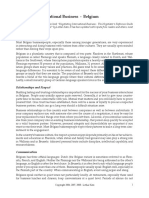How To Negociate With Canada
How To Negociate With Canada
Uploaded by
Antonio VidalCopyright:
Available Formats
How To Negociate With Canada
How To Negociate With Canada
Uploaded by
Antonio VidalOriginal Description:
Original Title
Copyright
Available Formats
Share this document
Did you find this document useful?
Is this content inappropriate?
Copyright:
Available Formats
How To Negociate With Canada
How To Negociate With Canada
Uploaded by
Antonio VidalCopyright:
Available Formats
Negotiating International Business - Canada
This section is an excerpt from the book “Negotiating International Business - The Negotiator’s Reference Guide
to 50 Countries Around the World” by Lothar Katz. It has been updated with inputs from readers and others, most
recently in March 2008.
Most Canadian businesspeople, especially those among younger generations, are experienced in
interacting and doing business with visitors from other cultures. They often take a genuine interest
in other countries and are usually open-minded rather than forcing their ways upon you.
Canada’s heterogeneous population is composed of the English-speaking majority (Anglo-Cana-
dians or Anglophones representing almost 60 percent), and the French-speaking minority (French-
Canadians or Francophones, around 23 percent), most of whom live in the Quebec province. It is
essential to be aware of and respect the significant cultural and language differences between them.
There are also sizeable groups who have emigrated from other countries, including many of Asian
or Arab heritages. Many of them live in Toronto or Vancouver. The information provided in this sec-
tion pertains mostly to Anglo- and French-Canadians. In addition, it is important to recognize the
many unique characteristics that make the country distinct from the United States.
Style differences across Canada’s population can still be pronounced in smaller cities and rural ar-
eas. Western Canadians are usually open to doing business with people from many different coun-
tries and cultures, while people in Atlantic Canada can appear regionally focused and somewhat
closed-minded. The pace of business may be the fastest around Toronto and Ottawa.
Relationships and Respect
Generally, business relationships are only moderately important in this country. They are usually
not a necessary precondition for initial business interactions. Your counterparts’ expectation may be
to get to know you better as you do business together. This is especially true for Anglo-Canadians,
while French-Canadians tend to place more emphasis on building stronger relationships before en-
gaging in serious business interactions. Generally, people in the country may emphasize near-term
results over long-range objectives but are usually also interested in building long-term relation-
ships. However, many Canadians are competitive and may think it ok for partners in a productive
business relationship to cooperate and compete at the same time, a view that others from strongly
relationship-oriented cultures rarely share.
Business relationships in this country exist between companies as well as between individuals. If
your company replaces you with someone else over the course of a negotiation, it may be easy for
your replacement to take things over from where you left them. Likewise, if you introduce someone
else from your company into an existing business relationship, that person may quickly be accepted
as a valid business partner. This does not mean that the Canadians do not care about who they are
dealing with. Personal integrity and dependability are important if you want to win their trust.
In the country’s business culture, the respect a person enjoys depends primarily on his or her achieve-
ments and to a lesser degree, education. Rank and titles play a somewhat more important role here
than they do in the United States. Admired personal traits include honesty, ambition paired with
humility, tolerance, and reasonableness.
Copyright 2006, 2007, 2008 - Lothar Katz 1
Communication
Canada is officially bilingual. The federal government works in the two official languages, English
and French. Canadian English differs from both British and American English, though it is closer to
the latter. There are distinct differences between French and Canadian French. Most French-Cana-
dians also speak English.
Businesspeople in this country usually speak in a controlled fashion, only occasionally raising their
voices to make a point. At restaurants, especially those used for business lunches and dinners, keep
conversations at a quiet level. Being loud may be regarded as bad manners. Canadians are polite lis-
teners and rarely interrupt others. Periods of silence do not necessarily convey a negative message.
Anglo-Canadians usually do not openly show emotions, which is unlike French-Canadians, who
tend to be more animated and expressive. People generally converse standing around two to three
feet apart. French-Canadians will likely get closer than that.
While usually friendly and polite, communication in Canada is often quite direct. Canadians dislike
vague statements and may openly share their opinions and concerns. Too much diplomacy may
confuse and irritate them and can give the impression of insincerity. They may ask for clarifications
and rarely find it difficult to say ‘no’ if they dislike a request or proposal. If something is against
company policy or cannot be done for other reasons, your counterpart will likely say so. They may
view this as a simple statement of fact and might not understand that someone else could consider
this directness insensitive.
Gestures and body language are usually subtle in Canada. Physical contact is rare and best avoided.
Approval is shown by an upward pointing thumb or with the OK sign, with thumb and index fin-
ger forming a circle. Do not use your fingers to point at others. Instead, point with your head. Eye
contact should be frequent, as this conveys sincerity and helps build trust. However, do not stare at
people.
Initial Contacts and Meetings
Having a local contact can be an advantage, especially with French-Canadians, but it is usually not
a necessary precondition to doing business.
Negotiations in Canada can be conducted by individuals or teams of negotiators. Both approaches
have their distinct advantages. Since decisions are often made by individuals, meeting the decision-
maker one-on-one may help get results quickly. On the other hand, a well-aligned team with clearly
assigned roles can be quite effective when negotiating with a group of Canadians. Owing to the high
degree of individualism that characterizes the culture, Canadian teams are not always well aligned,
which sometimes makes it easy to play one member against the other.
Scheduling meetings in advance is required. However, you can sometimes do this on short notice,
especially if the parties have had previous business interactions. Canadians generally expect visi-
tors to be punctual. Avoid being more than 5 minutes late, and call ahead if you will be.
Names are usually given in the order of first name, family name. Use Mr./Ms. plus the family name.
If a person has an academic title, such as Doctor or Professor, use it instead, followed by the family
name. Before calling Canadians by their first name, wait until they offer it. This may happen quickly
since the use of first names is not a sign of intimacy. However, do not use the other person’s name
as frequently as you might in the United States. Introductions are usually accompanied by hand-
shakes. Men should wait for women to initiate handshakes. The standard greeting is ‘how are you?’
It is rhetorical, so it is best to respond with the same phrase or to say something like ‘fine, thank you,’
or ‘I’m doing great, and you?’
Copyright 2006, 2007, 2008 - Lothar Katz 2
The exchange of business cards is not a mandatory step, but it is best to bring a sufficient supply.
They may sometimes be exchanged at the end rather than the beginning of the meeting. It is benefi-
cial to include both French and English translations on your card. If you plan to conduct business in
the province of Quebec, it is vital that your card is translated into French. Show doctorate degrees
on your card and make sure that it clearly states your professional title, especially if you have the
seniority to make decisions. Offer your card to everyone present. You may not always get one in
return. When presenting your card, smile and keep eye contact, then take a few moments to look at
the card you received. Next, place it on the table in front of you.
Meetings usually start with some polite small talk, which can be brief. Humor, which should be
friendly and not overly ironic and sarcastic, is important and almost always appreciated. One’s
private life is not a subject for discussion around meetings. During the first meeting, it is best to
preserve an air of formality while remaining polite and cordial, listening more than speaking.
While one purpose of the initial meeting is to get to know each other, the primary focus will be on
business topics. Either the meeting leads to a straight decision or there will be a list of follow-up ac-
tions. Smaller deals may be decided and finalized at the first meeting. If the meeting concludes with-
out next steps being defined, this may mean that there is no interest to continue the discussion.
Presentation materials should be very attractive, with good and clear visuals. Prepare thoroughly
and make sure your key messages come across clearly. However, avoid delivering presentations
full of excitement and hype since they will make your Canadian audience suspicious. Stringent
French-language requirements exist in the province of Quebec, where you must provide a French
translation for promotional material and other documents. Even in other provinces, Canadian orga-
nizations may require your material to be in both English and French, especially when dealing with
government institutions. Make inquiries in advance if necessary.
Negotiation
Attitudes and Styles – To Canadians, negotiating is usually a joint problem-solving process. With
French-Canadians, however, it may mean engaging in a somewhat more aggressive debate aimed
at reaching a mutually agreeable solution. While the buyer is in a superior position, both sides in a
business deal own the responsibility to reach agreement. They may focus equally on near-term and
long-term benefits. The primary negotiation style is cooperative and people may be open to com-
promising if viewed helpful in order to move the negotiation forward. Since Canadians believe in
the concept of win-win, they expect you to reciprocate their respect and trust. They are often very
pragmatic and usually find compromises both sides can live with. While the negotiation exchange
may include conflicts, you should keep a positive attitude and show willingness to work with the
other side in an effort to reach agreement.
Should a dispute arise at any stage of a negotiation, you might be able to reach resolution by show-
ing willingness to compromise and appealing to your counterparts’ fairness.
Sharing of Information – Canadian negotiators usually spend time, sometimes a lot of it, gather-
ing information and discussing details before the bargaining stage of a negotiation can begin. They
may share a lot of information as a way to build trust. It can be very counterproductive to appear
as if you are hiding facts from your Canadian counterparts. However, they will usually accept it if
you state openly that you do not want to share certain information. They value information that is
straightforward and to the point. Do not provide misleading information as your counterparts will
likely consider this unfair and may try to ‘get even.’
Canadians are generally suspicious of hype and exaggerations and may respond negatively to a
‘hard sell’ approach that might be effective in the United States.
Copyright 2006, 2007, 2008 - Lothar Katz 3
Pace of Negotiation – Negotiations in Canada often move at a rapid pace. Though somewhat cau-
tious, Canadians believe in the ‘time is money’ philosophy almost as strongly as Americans do. Ac-
cordingly, your counterparts will generally want to finish the negotiation in a timely manner and
implement actions soon. Even complex negotiations may not require more than one trip, as follow-
up negotiations are often conducted via phone and e-mail.
Canadians generally prefer a monochronic work style. They are used to pursuing actions and goals
systematically, and they dislike interruptions or digressions. When negotiating, they often work
their way down a list of objectives in sequential order, bargaining for each item separately, and may
be unwilling to revisit aspects that have already been agreed upon. They may show little tolerance
if a more polychronic counterpart challenges this approach, which they view as systematic and ef-
fective. This rigid style may be difficult to tolerate for negotiators from highly polychronic cultures,
such as most Asians, Arabs, some Southern Europeans, or most Latin Americans, who may view it
as closed-minded and overly restrictive. In any case, do not show irritation or anger when encoun-
tering this behavior. Instead, be willing to bargain over some items individually. Otherwise, clearly
indicate that your agreement is conditional and contingent on other items.
Stalling a negotiation in an attempt to create time pressure in order to obtain concessions, or to gain
the time needed to evaluate alternatives, may turn out to be a big mistake. Canadians hate wasting
time and have little patience if they feel that the other side may be hiding or holding back something.
Unlike in many other cultures, negotiators may actually become less inclined to make concessions if
they feel that the overall bargaining exchange is taking too long. Worst case, your counterparts may
lose interest in the deal.
Bargaining – Canadians are not overly fond of bargaining and dislike haggling. They can be tough
negotiators but are usually less aggressive than Americans may be. Appearing confident and asser-
tive is essential, though, since facing an apparently insecure counterpart may encourage Canadians
to negotiate harder. State your position clearly and be willing to push for it as needed.
Negotiators in Canada may take firm positions at the beginning of the bargaining process. Once you
convince them that you are intent on holding your own, they may become more willing to make
concessions. However, prices rarely move by more than 10 to 20 percent between initial offer and
final agreement.
Most people in this country expect to negotiate ‘in good faith.’ However, they may occasionally
use deceptive negotiation techniques such as telling lies and sending fake non-verbal messages,
pretending to be disinterested in the whole deal or in single concessions, misrepresenting an item’s
value, or making false demands and concessions. Do not lie at or otherwise grossly mislead your
counterparts, as doing so might damage or even destroy business relationships. Since ‘good cop,
bad cop’ requires strong alignment between the players, only experienced negotiators who have
spent time practicing the tactic may be using it. Carefully orchestrated, it may be effective in your
own negotiation approach. Businesspeople may claim limited authority, stating that they have to
ask for their manager’s approval. This could be a tactic or the truth.
Canadian negotiators may use pressure techniques that include opening with their best offer, show-
ing intransigence, making final or expiring offers, or nibbling. When using similar tactics yourself,
clearly explain your offer and avoid being aggressive. Avoid making decreasing offers, as they will
likely be viewed as inappropriate and offensive. Silence can sometimes be effective as a way to con-
vey displeasure. Be careful when attempting to create time pressure. Although it can be very effec-
tive since the Canadians’ sense of urgency usually works against them, their level of interest could
drop and they might start considering alternatives to the deal at hand. Persistence is important,
though, and you will frequently find your counterparts exploring all options to bring the negotia-
tion to a successful close as quickly as they can.
Copyright 2006, 2007, 2008 - Lothar Katz 4
Avoid aggressive tactics when negotiating with Canadians. They will not shy away from open con-
frontation if challenged, but this is likely to deteriorate rather than strengthen your bargaining po-
sition. French-Canadians may sometimes appear aggressive as the bargaining gets more heated.
Remind yourself that they may not perceive it that way. Opening with an extreme offer may be
viewed as an unfriendly act. It is best to open with one that is already in the ballpark of what you
really expect.
Other emotional negotiation techniques may be more frequent. Canadians may employ attitudinal
bargaining or send dual messages. It is often best simply to ignore these tactics. Attempts to make
you feel guilty and appeals to personal relationships are rare since people believe that these have
no place in business. However, using these tactics yourself may be surprisingly effective with some
negotiators.
Canadian businesspeople may employ defensive tactics such as changing the subject, blocking,
asking probing or direct questions, making promises, or keeping an inflexible position. Attempts
to change the subject repeatedly in order to confuse your counterparts may meet with resistance,
though.
Introducing written terms and conditions may be effective tactics that could help shorten the bar-
gaining process, which most of your Canadian counterparts may find desirable. Similarly, they may
frequently attempt to introduce pre-printed clauses. Unless these are based on company policies,
which are usually non-negotiable, you should ignore such attempts and insist that all terms and
conditions be discussed and agreed upon individually.
Corruption and bribery are very rare in Canada. It is strongly advisable to stay away from giving
gifts of significant value or making offers that could be read as bribery.
Decision Making – Canadian companies are usually not overly hierarchical. Nevertheless, they
usually have extensive policies and processes that may affect decision making. They are almost al-
ways followed. Decision makers are usually individuals who may or may not consult with others in
the group or organization. Managers are expected to accept responsibility for their own as well as
their employees’ actions. Decision-making authority is often delegated to lower levels in the hierar-
chy and may not require any further approval from others. Generally, the size of a deal determines
how high in the organization you need to go. Once the bargaining process has concluded, decisions
are often made quickly.
When making decisions, businesspeople may apply universal principles rather than considering
the specific situation. This is especially true for French-Canadians. Empirical evidence and other
objective facts weigh much more strongly than personal feelings and experiences do. Canadians are
medium risk takers who are often a bit more cautious than Americans may be.
Agreements and Contracts
Capturing and exchanging meeting summaries can be an effective way to verify understanding and
commitments. Many Canadians pride themselves with being consistent, so they will likely keep
their commitments, at least if they are sufficiently documented. While you should not consider in-
terim agreements final, avoid the impression that you are not willing to hold up your commitments.
Nevertheless, only a contract signed by both parties constitutes a binding agreement.
Written contracts tend to be lengthy and somewhat legalistic. They often spell out detailed terms
and conditions for the core agreements as well as for many eventualities. They usually represent ir-
revocable commitments to the terms and conditions they define and can only be changed with both
partners’ consent.
Copyright 2006, 2007, 2008 - Lothar Katz 5
Always consult a legal expert who has sufficient relevant experience before signing a contract. While
the society is not quite as litigious as the one in the United States, Canadians are also quite willing
to enforce contracts in court if necessary. Your legal counsel may also attend negotiations to provide
legal advice throughout the bargaining process.
Contracts are usually dependable, and the agreed terms are viewed as binding. Requests to change
contract details after signature may be considered as bad faith and will meet with strong resis-
tance.
Women in Business
While women enjoy similar rights as men, many of them are still struggling to attain positions of
similar income and authority. Nonetheless, Canadian women expect to be treated seriously and re-
spectfully. A visiting businesswoman should have few problems in the country.
Other Important Things to Know
Business lunches and dinners are common. Canadians often discuss business during meals.
Punctuality is also valued in many social settings. It is best to be right on time for dinners, and to
arrive at parties within 10 to 15 minutes of the agreed time.
Gift giving in business settings is rare, especially early in your engagement. It is best not to bring a
gift to an initial meeting in order to avoid raising suspicions about your motives. However, partners
may exchange small gifts when the contract is signed.
Negotiating International Business (Booksurge Publishing, second
edition 2007) is available from Amazon.com and other bookstores for
$29.99. A reference guide covering 50 countries around the world,
the 472-page book includes an extensive discussion of the negoti-
ation principles and tactics frequently referred to in this excerpt.
Please recommend this Country Section and others to colleagues who
might find them useful. Country Sections are available individually at
www.NegIntBiz.com
Copyright 2006, 2007, 2008 - Lothar Katz
Modifying this excerpt, or using it in whole or in parts without proper attribution, is strictly prohibited by law.
You might also like
- PRINCE2® Foundation Mock Exam - Free Practice Test - SimplilearnDocument30 pagesPRINCE2® Foundation Mock Exam - Free Practice Test - SimplilearnahmedNo ratings yet
- It Is Ongoing and RepetitiveDocument49 pagesIt Is Ongoing and RepetitiveGino0% (1)
- MAS23724 SolutionDocument25 pagesMAS23724 SolutionAditiNo ratings yet
- Salary&compDocument28 pagesSalary&compvenus121No ratings yet
- AUC-Knowledge QuestionsDocument68 pagesAUC-Knowledge QuestionsFarhan SethNo ratings yet
- Example Team CharterDocument5 pagesExample Team CharterErz SeNo ratings yet
- Siemens MSP Case Study 2Document6 pagesSiemens MSP Case Study 2pasareaNo ratings yet
- CHPP Application Guidance Webamends1Document46 pagesCHPP Application Guidance Webamends1PrakashNo ratings yet
- All About Stakeholders - Part 1Document7 pagesAll About Stakeholders - Part 1teslimsNo ratings yet
- Morris & Jamieson (2004) Translating Corporate Strategy Into Project StrategyDocument119 pagesMorris & Jamieson (2004) Translating Corporate Strategy Into Project StrategyricardoronchettiNo ratings yet
- Negotiating International Business-ChinaDocument10 pagesNegotiating International Business-ChinaRazi FadlonNo ratings yet
- Negotiating International Business With ArgentinaDocument7 pagesNegotiating International Business With ArgentinaAntonio VidalNo ratings yet
- Prince2 - Sample Paper 2Document16 pagesPrince2 - Sample Paper 2ikrudisNo ratings yet
- Right Projects Done Right: From Business Strategy to Successful Project ImplementationFrom EverandRight Projects Done Right: From Business Strategy to Successful Project ImplementationNo ratings yet
- Corporations in Financial Difficulty: Multiple Choice QuestionsDocument27 pagesCorporations in Financial Difficulty: Multiple Choice QuestionsDieter LudwigNo ratings yet
- Prince2 Fact SheetDocument3 pagesPrince2 Fact SheetJinith John JosephNo ratings yet
- Prince 2: A Methodology of Project ManagementDocument16 pagesPrince 2: A Methodology of Project Managementdragon_jgaNo ratings yet
- Extreme NegotiationsDocument8 pagesExtreme Negotiationsgaurav aroraNo ratings yet
- PMP Smart Start GuideDocument61 pagesPMP Smart Start GuideTransfeo Parala100% (1)
- Project Management: Systems Analysis and Design, 7e Kendall & KendallDocument50 pagesProject Management: Systems Analysis and Design, 7e Kendall & KendallAnonymous 836sAQZpGGNo ratings yet
- Project Manager Vs Project CoordDocument5 pagesProject Manager Vs Project CoordAnonymous OuY6oAMggxNo ratings yet
- Beginner's Guide To PMP Certification ExamDocument18 pagesBeginner's Guide To PMP Certification ExamMuhammad Rauf Akram100% (1)
- Agile Scrum GlossaryDocument5 pagesAgile Scrum GlossaryCarolina Becerra TellezNo ratings yet
- Seqrite Endpoint Security EPS Administrator GuideDocument187 pagesSeqrite Endpoint Security EPS Administrator GuideSopan sonarNo ratings yet
- MS Projects Day 2 FinalDocument183 pagesMS Projects Day 2 FinalDushan SenarathneNo ratings yet
- Lesson 01 - Introduction To PMI-RMP® Certification CourseDocument22 pagesLesson 01 - Introduction To PMI-RMP® Certification CourseSamuel100% (1)
- Project Sponsor Support: Property and Construction DirectorateDocument4 pagesProject Sponsor Support: Property and Construction DirectorateDody HaryadiNo ratings yet
- NegotationDocument330 pagesNegotationMytcoavanzaNo ratings yet
- GB - PRINCE2 Foundation Exam - Sample Paper 1 - January 13 Release - RationaleDocument27 pagesGB - PRINCE2 Foundation Exam - Sample Paper 1 - January 13 Release - RationaleKhaledhosny2010No ratings yet
- Prince2primer RoadmapDocument21 pagesPrince2primer RoadmapgeltinNo ratings yet
- Outsourcing and Risk Management: Procurement & Supply Chain Prof. Corrado CerrutiDocument20 pagesOutsourcing and Risk Management: Procurement & Supply Chain Prof. Corrado CerrutiBrij RaiNo ratings yet
- Guidehouse Presentation To CouncilDocument21 pagesGuidehouse Presentation To CouncilDougNo ratings yet
- Project ManagementDocument13 pagesProject Managementalberto micheliniNo ratings yet
- Business EtiquetteDocument3 pagesBusiness EtiquetteOlivia GabrielaNo ratings yet
- Guidelines Preparing For Brexit Customs 12 November 2020Document62 pagesGuidelines Preparing For Brexit Customs 12 November 2020arzaianNo ratings yet
- Influence and Negotiation Strategies Program, Standford, 2013Document2 pagesInfluence and Negotiation Strategies Program, Standford, 2013coxfnNo ratings yet
- P2-7 FND SamplePaper2 QuestionsDocument24 pagesP2-7 FND SamplePaper2 Questionsdocteur.jacqulineNo ratings yet
- Lesson 3.A: Cultural Dimensions and Dilemmas (CH 5)Document38 pagesLesson 3.A: Cultural Dimensions and Dilemmas (CH 5)Leon WuNo ratings yet
- Prince2 Foundation Quiz QuestionsDocument1 pagePrince2 Foundation Quiz QuestionsFaith WilliamsNo ratings yet
- PRINCE2 Practitioner Exam Guide - by Ashish Dhoke (ProjectingIT)Document16 pagesPRINCE2 Practitioner Exam Guide - by Ashish Dhoke (ProjectingIT)projectingIT100% (1)
- 175 PMP Sample QuestionsDocument78 pages175 PMP Sample QuestionsJuan Luis FerretNo ratings yet
- .How Do You Select ProjectDocument16 pages.How Do You Select Projectp comNo ratings yet
- Project ManagementDocument23 pagesProject ManagementAmmar Hunzai100% (1)
- Assessment of The Contributions of Nigerian Union of Local Government Employees (Nulge) To Conflict Resolution in Ibaji Local Government Area, Kogi State. NigeriaDocument6 pagesAssessment of The Contributions of Nigerian Union of Local Government Employees (Nulge) To Conflict Resolution in Ibaji Local Government Area, Kogi State. NigeriaInternational Journal of Innovative Science and Research Technology100% (1)
- PMP - 01 Intro To PMPDocument23 pagesPMP - 01 Intro To PMPmarks2muchNo ratings yet
- A Framework For Thinking EthicallyDocument4 pagesA Framework For Thinking EthicallyYashaswiPathakNo ratings yet
- Severity Omega - the It Project Crisis Management Handbook: A Toolbox for Handling Crises in It ProjectsFrom EverandSeverity Omega - the It Project Crisis Management Handbook: A Toolbox for Handling Crises in It ProjectsNo ratings yet
- PMP Must WatchDocument10 pagesPMP Must Watchrashdan rosmanNo ratings yet
- Chapter 3 - Defining and Prioritizing Stakeholders.Document29 pagesChapter 3 - Defining and Prioritizing Stakeholders.EshaNo ratings yet
- Basic and AdvancedDocument299 pagesBasic and AdvancedbariNo ratings yet
- Appendix X3 Interpersonal SkillsDocument5 pagesAppendix X3 Interpersonal SkillsMuhammad NadeemNo ratings yet
- The Affinity Diagram: PMP Planning Tools That You Should KnowDocument2 pagesThe Affinity Diagram: PMP Planning Tools That You Should KnowSamuel ZvimbaNo ratings yet
- Ricardo Vargas Simplified Program Flow Color A3 enDocument1 pageRicardo Vargas Simplified Program Flow Color A3 envigneshwaranjNo ratings yet
- Introduction To p3m3, 19th Jan BoltonDocument72 pagesIntroduction To p3m3, 19th Jan BoltoncavbmiNo ratings yet
- Project Management A Managerial ApproachDocument20 pagesProject Management A Managerial ApproachSANATAN PRASAD100% (1)
- Prince2 2017 Foundation ClassroomDocument2 pagesPrince2 2017 Foundation ClassroomRamiz JavedNo ratings yet
- Agile NotesDocument6 pagesAgile NotesGahbilan DevadasNo ratings yet
- Project Management Assignment 3Document2 pagesProject Management Assignment 3Amar ChotaiNo ratings yet
- Passing Prince2 Foundation Exam EbookDocument8 pagesPassing Prince2 Foundation Exam EbookMudassir HussainNo ratings yet
- 11 Point Plan Passing Your Prince2 Exam PDFDocument2 pages11 Point Plan Passing Your Prince2 Exam PDFbbking44No ratings yet
- Greece PDFDocument6 pagesGreece PDFAntonio VidalNo ratings yet
- How To Negociate With IndonesiaDocument7 pagesHow To Negociate With IndonesiaAntonio VidalNo ratings yet
- How To Negociate With EgyptDocument6 pagesHow To Negociate With EgyptAntonio VidalNo ratings yet
- How To Negociate With DenmakDocument5 pagesHow To Negociate With DenmakAntonio VidalNo ratings yet
- Chile PDFDocument6 pagesChile PDFAntonio VidalNo ratings yet
- How To Negociate With ChinaDocument10 pagesHow To Negociate With ChinaAntonio Vidal100% (1)
- Colombia PDFDocument6 pagesColombia PDFAntonio VidalNo ratings yet
- How To Negociate With BelgiumDocument5 pagesHow To Negociate With BelgiumAntonio VidalNo ratings yet
- How To Negociate With AustriaDocument5 pagesHow To Negociate With AustriaAntonio VidalNo ratings yet
- Rosicrucian Fellowship - Max Heindel - May/June 2011Document63 pagesRosicrucian Fellowship - Max Heindel - May/June 2011Ber WeydeNo ratings yet
- Rezumat Violenta DomesticaDocument2 pagesRezumat Violenta DomesticaDaniela-MonicaGuzuNo ratings yet
- Alfred MccoyDocument8 pagesAlfred MccoyJang Ye BinNo ratings yet
- Assessing The Adaptive Behavior of Youths - Multicultural ResponsivityDocument11 pagesAssessing The Adaptive Behavior of Youths - Multicultural ResponsivityMos CraciunNo ratings yet
- 5 Style and RegisterDocument8 pages5 Style and RegisterNasyita AqilahNo ratings yet
- FA4U1P2Document3 pagesFA4U1P2Nhi TrầnNo ratings yet
- The Art of Love Erich Fromm & The Expanse of LoveDocument5 pagesThe Art of Love Erich Fromm & The Expanse of Loved4nielNo ratings yet
- Faculty: DR Yashoda Verma - Class: Bachelor of Hotel ManagementDocument8 pagesFaculty: DR Yashoda Verma - Class: Bachelor of Hotel Managementdryash vermaNo ratings yet
- The American PeriodDocument4 pagesThe American PeriodEllah GutierrezNo ratings yet
- CM - English 9Document7 pagesCM - English 9Yuri IssangNo ratings yet
- Wang-Official Art in Contemporary China PDFDocument363 pagesWang-Official Art in Contemporary China PDFcrazyfinnaNo ratings yet
- Aug 3 Metals NonmetalsDocument4 pagesAug 3 Metals NonmetalsJayson Namuco100% (2)
- Skit Performance Rubric PDFDocument1 pageSkit Performance Rubric PDFdinejedidah100% (1)
- Accomplishment Report in ScienceDocument4 pagesAccomplishment Report in ScienceMichelle Alejo Cortez90% (10)
- Traditional Social Studies Lesson PlanDocument7 pagesTraditional Social Studies Lesson Planapi-340862505No ratings yet
- Nature, Human Nature, &human Difference: Race in Early Modern PhilosophyDocument2 pagesNature, Human Nature, &human Difference: Race in Early Modern PhilosophyKumalaNo ratings yet
- Learner Variables in L2 Learning: - Cognitive and Affective FactorsDocument33 pagesLearner Variables in L2 Learning: - Cognitive and Affective FactorsSylvaen WswNo ratings yet
- James C. Scott - Everyday Forms of ResistanceDocument30 pagesJames C. Scott - Everyday Forms of ResistanceJuan Antonio Huizar SanchezNo ratings yet
- Pumpkin Life CycleDocument8 pagesPumpkin Life Cycleapi-273338005No ratings yet
- Philippines in The 19th CenturyDocument3 pagesPhilippines in The 19th CenturyIG5625No ratings yet
- DELTA Module 1 Testing TerminologyDocument2 pagesDELTA Module 1 Testing TerminologyEdgarNo ratings yet
- LCC BR Bx2023textDocument636 pagesLCC BR Bx2023textWilliam Lam Kian SanNo ratings yet
- 4 Clothes and AppearanceDocument4 pages4 Clothes and AppearanceAnhNo ratings yet
- Romanticism: A Movement Across The ArtsDocument14 pagesRomanticism: A Movement Across The ArtsHydee Samonte TrinidadNo ratings yet
- Dynamics of People and OrganizationDocument22 pagesDynamics of People and OrganizationLeonardo Flores100% (2)
- Advice Regarding Being A Student of Knowledge and Taking NotesDocument3 pagesAdvice Regarding Being A Student of Knowledge and Taking NotestrannyrocksNo ratings yet
- Education and Training in The Light of The Prophets (S.A.W)Document4 pagesEducation and Training in The Light of The Prophets (S.A.W)Ali PuriNo ratings yet
- How To Convert Your Gpa To A 4Document2 pagesHow To Convert Your Gpa To A 4api-239256129No ratings yet
- Navy Blue Line of Patterned Squares College ResumeDocument1 pageNavy Blue Line of Patterned Squares College ResumeAl HakimNo ratings yet
- (Human Cognitive Processing) Reka Benczes-Creative Compounding in English - The Semantics of Metaphorical and Metonymical Noun-Noun Combinations-John Benjamins Pub Co (2006)Document224 pages(Human Cognitive Processing) Reka Benczes-Creative Compounding in English - The Semantics of Metaphorical and Metonymical Noun-Noun Combinations-John Benjamins Pub Co (2006)sabina100% (1)


































































































